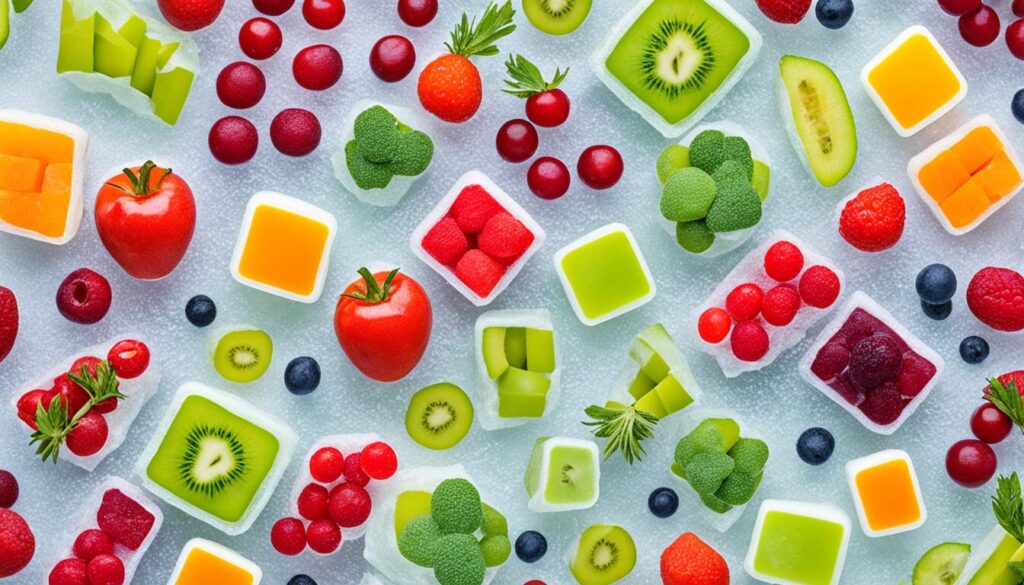The American Frozen Food Institute (AFFI) and other industry players highlight frozen foods‘ key role in meeting U.S. sustainability goals. Alison Bodor, AFFI’s President and CEO, points out how frozen food fights food loss and waste at every stage. This includes sales, food services, and at home.
The group supports spreading awareness, improving the cold chain, and studying why people waste food. They also aim to make healthier food more accessible. Research shows that frozen foods help cut food waste by offering nutritious choices all year. They also are convenient and can save money, especially for those on SNAP benefits.
These benefits show how frozen foods play a big part in sustainability efforts. They are a key player in lowering food waste.
The Role of Frozen Food in Reducing Food Waste
Frozen food is key to reducing food waste. It uses the freezing process to last longer, cutting spoilage. This method keeps food fresh, saving nutrients and taste.
Extended Shelf Life and Reduced Spoilage
Freezing food lets it stay edible for longer. This stops food from going bad too soon. People can keep products fresh longer, cutting down on waste.
Seasonal Availability Year-Round
A big plus is having seasonal foods all year. Freezing them spreads out their need, avoiding shortages. This means enjoying seasonal favorites anytime without lack.
Portion Control and Responsible Consumption
Frozen food helps control how much is used, preventing too much from being made. Research shows less frozen food is thrown away, teaching good consumption. This is from studies at Cornell University.
Benefits of Using Frozen Food in Sustainability Goals
Adding frozen foods to green efforts offers many pluses. They help with good nutrition, fight against waste, and make sure people get needed nutrients and food. This shows how vital frozen food is for big plan-to-save-the-planet goals.
Preservation of Nutritional Value
Freezing keeps food fresh and locks in its nutrients. The American Frozen Food Institute found that frozen fruits and veggies often have more nutrients than fresh ones. This means you can enjoy meals packed with nutrients whatever the season.
Environmental Impact
Yes, making frozen foods uses energy. But, throwing away food, which frozen food helps prevent, creates more harmful emissions. To reduce this, the industry is working on using less energy and more eco-friendly coolants. This way, the impact on the earth from freezing food is less.
Health and Nutrition Security
Frozen foods play a big role in making sure everyone can eat well. They offer affordable, healthy choices for many, including those who might not have easy access to fresh foods. This means there are nutritious foods to eat all year, tackling issues like food access and fairness.
The Importance of Private Label Frozen Food Manufacturer in Waste Reduction
Companies like Aldi greatly reduce waste by how they handle frozen food. They use eco-friendly refrigerants. This keeps food fresh and full of nutrients. It helps meet green goals.
These firms offer many services in making frozen food too. This makes frozen food easier to buy and use, cutting down on waste.
Custom frozen food production is key for food sustainability. Making food that fits what people want means less gets thrown out.
In the end, private label makers do a lot to cut waste. They make food more available and affordable. Their smart methods also mean less food is wasted. This all helps the planet and people stay healthy.
Innovations in Freezing Technology Enhancing Food Preservation
New technologies have changed how we freeze food. These changes make sure frozen food stays high quality and sustainable. They improve how we freeze and package foods to reduce waste and last longer.
Blast Freezing and Flash Freezing
Blast and flash freezing keep foods like new. They quickly lower the temperature, stopping big ice crystals from forming. This helps keep the food’s texture and taste. Blast freezing works well for soft foods like fruits and seafood.
Advancements in Sustainable Freezing Technologies
The freezing industry is going green. New studies show that by adjusting how cold we keep foods, we can cut CO2 emissions a lot. Sustainable freezing technologies help save energy and meet eco-friendly goals.
Eco-Friendly Packaging Solutions
New eco-friendly packaging is also making a difference. It uses materials that are good for the planet and keep food fresh. By using materials that can break down or be used again, the packaging helps the earth.
Educational Campaigns to Promote Frozen Food Usage
Consumer education is key to show how frozen foods fight food waste. These efforts highlight the benefits, like extended shelf life and always having seasonal fruits and veggies. They teach people to use food in ways that help our planet.
The American Frozen Food Institute (AFFI) is a leader in this movement. They back a nationwide effort to promote frozen foods. This pushes the message that choosing frozen can lower food waste and meet personal green goals.
These learning campaigns are broad in their approach. They tackle issues from how to keep food longer to why that helps our earth. Plus, they talk about how convenient and budget-friendly frozen foods are.
By showing the key role of frozen foods in cutting waste, these campaigns help people get it. They come to see frozen foods as a must for saving household costs and the environment. So, these campaigns are not only about boosting frozen food usage. They’re also about pushing for smart shopping habits.
Conclusion
Frozen food is key in the fight against global food waste. It helps us consume food sustainably and improves food storage. The long shelf life it offers reduces spoilage, letting us have healthy food all year. This is a big win for the planet and fits into our efforts for a greener world.
The American Frozen Food Institute and private label makers are pushing for better in the frozen food scene. They’re focusing on making frozen food a leader in cutting waste and caring for the environment.
Using new freezing tech and spreading the word about frozen foods help too. The ongoing advancements in how we freeze and package food make frozen products more sustainable. Looking forward, we know frozen food will play a major role in a world that watches its waste. It will be key for both us, the consumers, and our planet.

